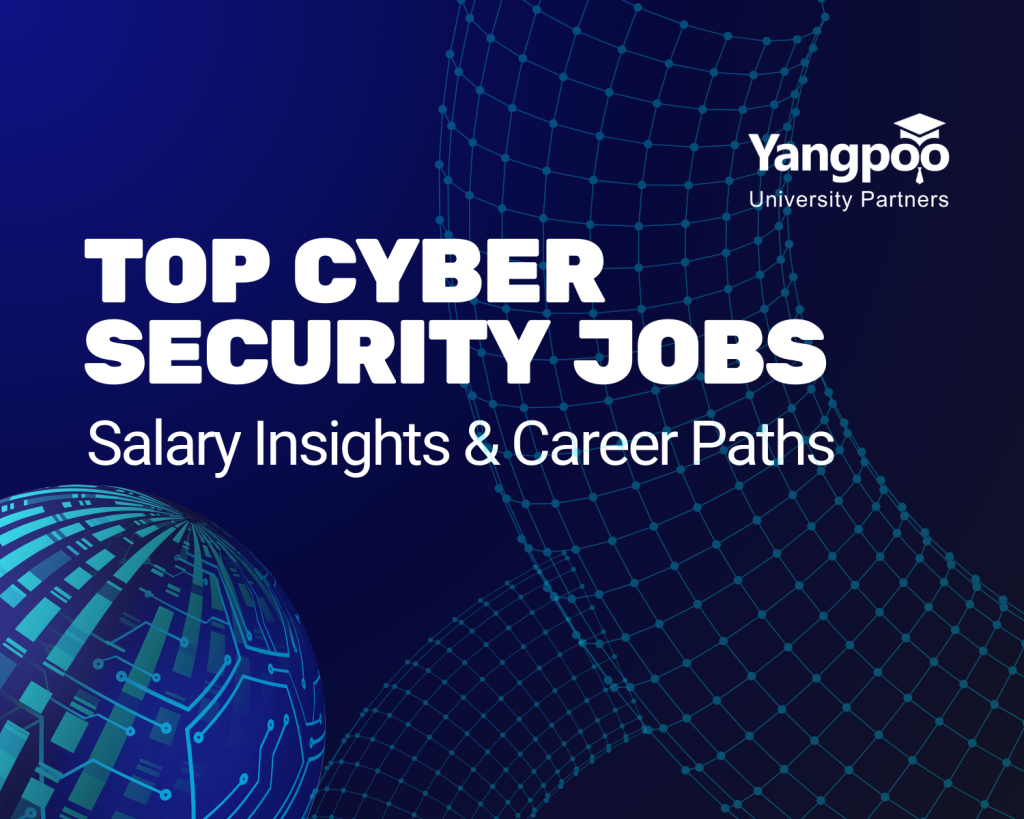In today’s digital landscape, the demand for cybersecurity professionals is skyrocketing, driven by the alarming rise in cyberattacks. Enterprises witnessed a staggering 50% increase in attempted cyberattacks in 2021 alone, leading to a significant spike in cybersecurity jobs salaries. This surge has made companies willing to invest heavily in securing top-tier cybersecurity talent to safeguard their valuable data.
This blog dives into the most sought-after cybersecurity jobs and their salaries in 2024, covering roles such as ethical hackers, cloud security specialists, and chief information security officers. We’ll explore what it takes to land these lucrative positions and why companies are willing to go above and beyond to secure the best in the business. Whether you’re starting a career in cybersecurity or looking to level up, this guide will provide key insights into high-paying job opportunities with competitive cybersecurity salaries
Understanding the Basics of Cyber Security
As technology advances, so does the sophistication of cyber threats, making cybersecurity an essential practice for individuals and businesses alike. At its core, cybersecurity is about protecting sensitive information from unauthorized access, theft, and damage. A career in this field offers not only the potential for professional growth but also competitive cybersecurity salaries as demand continues to rise.
The fundamentals of cybersecurity revolve around the CIA(top intelligence agency of USA) triad: Confidentiality, Integrity, and Availability. These pillars ensure that sensitive data remains private, unaltered, and accessible only to authorized users.
Some of the primary concepts include:
- Threat Identification: Recognizing potential risks to digital assets.
- Intrusion Detection: Monitoring systems to detect unauthorized access.
- Incident Response: Taking action to neutralize cyber threats and minimize damage.
- Data Recovery: Restoring systems after a breach.
Understanding these core concepts is crucial for anyone aiming to thrive in the cybersecurity field, where cybersecurity salary trends reflect the importance of these roles.Moreover, familiarizing yourself with key cybersecurity terminologies—such as VPNs, IP addresses, encryption, firewalls, and DNS—will help you navigate the ever-evolving landscape of online security.
From malware to phishing attacks, we’ll also delve into the common types of cyberattacks that businesses face and how you can mitigate these risks, all while exploring how the cybersecurity salary landscape evolves in parallel with these growing challenges.
The Need for Cybersecurity & Its Significance in Today’s Digital World
The growing need for cybersecurity is driven by the increasing frequency of data breaches and sophisticated cyberattacks targeting businesses across all industries. Protecting sensitive data, such as PII, PHI, and intellectual property, is essential to avoid significant financial and reputational damage. As cybercriminals evolve, traditional defenses like antivirus software and firewalls are no longer sufficient, which has increased demand for skilled professionals, driving up the salary of a cybersecurity professional.
The widespread adoption of cloud services, such as AWS, has expanded the risk landscape, with many companies struggling to properly configure security settings. Recent incidents, like the MOVEit Transfer zero-day attack and WannaCry ransomware, highlight the urgent need for robust cybersecurity measures. The widespread adoption of UPI has led to a surge in online payments, but this growth has also brought about increased security risks—small businesses and common masesss are also at risk of irreparable harm from breaches. These growing threats are creating more opportunities in types of cybersecurity jobs and salary offerings across the board.
With rising cyber threats, organizations are offering more competitive cybersecurity salary per month packages, particularly for cybersecurity salary for freshers, to attract talent capable of defending against these evolving risks. Investing in advanced cybersecurity strategies and employee training is essential for businesses to stay protected and ahead of cybercriminals. As threats grow, so will opportunities for well-trained cybersecurity professionals, with the average cybersecurity salary increasing alongside demand.
Factors affecting cybersecurity
When we talk about cybersecurity salaries for freshers’ security jobs for fresher’s, salary expectations can depend on many factors. To be more realistic, these factors not only affect freshers but also impact the salary of a cyber-security professional who has working experience.
Experience and Expertise: As expected, experience plays a crucial role in determining a cybersecurity professional’s salary. Individuals with a solid track record and specialized skills in areas like penetration testing, incident response, or cloud security can command higher salaries.
Certifications: Certifications like Certified Information Systems Security Professional (CISSP), Certified Ethical Hacker (CEH), or Certified Information Security Manager (CISM) validate an individual’s expertise and can significantly boost their earning potential.
Location: Salaries in cybersecurity can vary depending on the city or region. Metropolitan areas like Mumbai, Delhi, and Bengaluru generally offer higher compensation due to the concentration of tech companies and increased demand for cybersecurity talent.
Company Size and Industry: Larger organizations and those in sectors like finance, healthcare, and technology often have more complex security needs and are willing to pay higher salaries to attract top talent.
Role and Responsibilities:
The specific role within cybersecurity can also affect salary. For instance, a Chief Information Security Officer (CISO) will typically earn more than a type of cybersecurity job and salary.
Market Demand: The overall demand for cybersecurity professionals in India is on the rise, which can drive up salaries.
As more organizations recognize the importance of cybersecurity, talent competition can intensify, leading to higher compensation packages.
Negotiation Skills:
An individual’s negotiation skills can also influence their salary. Demonstrating the value they bring to an organization and effectively negotiating their compensation can lead to higher offers.
The Scope of Cybersecurity Careers in India
The global cybersecurity market is set for rapid expansion, expected to grow from USD 173.5 billion in 2022 to USD 266.2 billion by 2027, with an annual growth rate of 8.9%. In line with global trends, India’s cybersecurity sector is also witnessing significant growth. By 2024, the Indian cybersecurity market is projected to reach USD 4.70 billion, and further grow to USD 10.90 billion by 2029, with a strong annual growth rate of 18.33%. This growth is driving up the average cyber security salary in India.
This rise is driven by increasing digitalization across industries, greater awareness of cybersecurity risks, and more stringent regulatory demands. Cloud-based cybersecurity solutions, in particular, are in high demand, as over 60% of Indian enterprises are expected to shift to cloud platforms, necessitating robust measures to protect data. These developments have directly impacted the types of cyber security jobs and salaries, making the sector highly attractive for professionals seeking lucrative opportunities.
The Indian government has made cybersecurity a priority, with initiatives to enhance national defenses and international partnerships, such as those with the United States. Key sectors like healthcare, manufacturing, and government have seen heightened cybersecurity needs, especially post-COVID-19.
This ongoing growth, combined with rising cyber threats and evolving regulations, has created a vast scope for cybersecurity careers in India, making it a highly promising field for professionals.
Industries Hiring Cybersecurity Professionals
Several industries are actively seeking cybersecurity talent:
Several industries are actively seeking cybersecurity talent, offering competitive cybersecurity salary per month packages:
- IT & Software: Companies like Infosys and TCS need experts to secure networks and data.
- Finance: Banks like HDFC hire cybersecurity professionals to prevent fraud and ensure regulatory compliance.
- Healthcare: Hospitals and firms like Apollo need protection for sensitive patient data.
- Government & Defense: Agencies like DRDO require specialists to safeguard national security.
- E-commerce: Retail giants like Amazon and Flipkart prioritize customer data protection.
Other sectors, including manufacturing, telecom, and education, are also expanding cybersecurity roles to address growing digital threats.
1. Network Security
Network security solutions protect systems from attacks by controlling data and access. Technologies like Data Loss Prevention (DLP), Identity Access Management (IAM), and Next-Generation Firewalls (NGFW) secure networks. Advanced tools such as Intrusion Prevention Systems (IPS), Sandboxing, and Security Orchestration and Response (SOAR) provide added protection.
- Cloud Security
Cloud security strategies safeguard cloud infrastructure, applications, and data. While cloud providers offer some protection, third-party solutions are often required to ensure enterprise-level security, protecting against data breaches and targeted attacks.
- Endpoint Security
Endpoint security safeguards user devices like laptops through anti-phishing and anti-ransomware technologies, creating micro-segments around data. It also includes forensic tools such as Endpoint Detection and Response (EDR) for threat prevention.
- Mobile Security
Mobile security protects smartphones and tablets from threats like phishing and malicious apps. Using Mobile Device Management (MDM), enterprises ensure compliance, preventing unauthorized access to sensitive data.
- IoT Security
IoT security protects connected devices from vulnerabilities. By classifying devices and controlling network access, it shields against threats and exploits, preventing attacks on corporate networks or IoT systems.
- Application Security
Application security addresses threats like injection attacks and cross-site scripting. By using tools like OWASP’s Top 10 list, it protects web applications and APIs from malicious attacks.
- Zero Trust
Zero trust security abandons traditional perimeter-focused models. Instead, it uses micro-segmentation and role-based access controls to protect individual resources in cloud and remote work environments.
With the increasing demand for cybersecurity professionals, types of cybersecurity jobs and salary options are expanding across industries, ensuring a promising future for those entering the field.
Common Types of Cyber Attacks
| Phishing | Fraudulent attempts to obtain sensitive information by disguising as a trustworthy entity in electronic communication | User education: Train employees to recognize phishing attempts. Email filtering: Implement robust email filters to identify and block phishing emails. Strong passwords: Encourage the use of strong, unique passwords. Multi-factor authentication. |
| Ransomware | Malware that encrypts files and demands payment for decryption | Regular backups: Maintain frequent backups of critical data in an offline location. Patching: Keep software and operating systems updated with the latest security patches. Network segmentation: Isolate sensitive systems from the general network. User education: Educate users about the risks of clicking on suspicious links or downloading attachments from unknown sources. |
| Distributed Denial of Service | Overwhelming a system, service, or network with a flood of traffic from multiple sources | Network monitoring: Monitor network traffic for unusual patterns or spikes. Rate limiting: Implement rate limiting to prevent excessive traffic from reaching a system. Distributed Denial of Service (DDoS) mitigation: Consider using a DDoS mitigation service. |
| Man-in-the-Middle | Intercepting communication between two parties to eavesdrop or modify traffic | Use strong encryption protocols (e.g., HTTPS)
• Implement Virtual Private Networks (VPNs) • Avoid using public Wi-Fi networks • Use digital certificates |
| SOL | Inserting malicious SQL statements into application queries to manipulate or retrieve data | Use parameterized queries
• Implement input validation and sanitization • Apply the principle of least privilege to database accounts • Regularly update and patch databases |
| Social Engineering | Manipulating people into divulging confidential information | • Conduct regular security awareness training
• Implement strict authentication protocols • Establish clear procedures for sensitive operations • Foster a security-conscious culture |
| Malware | Software designed to disrupt, damage, or gain unauthorized access to a computer system | Keep software and operating systems updated
• Use reputable antivirus and anti-malware software • Implement application whitelisting • Practice safe browsing habits |
Essential Skills Required for Success in Cybersecurity
MBA Degrees from Top Universities at Yangpoo
|
conclusion
With the demand for cybersecurity professionals at an all-time high, there’s never been a better time to hone your skills and join this critical field. As cyber threats continue to rise globally, the need for cybersecurity experts is skyrocketing. According to the 2023 (ISC) Cybersecurity Workforce Study, the gap in the global cybersecurity workforce grew by 13% between 2022 and 2023, leaving nearly 4 million positions unfilled. This presents a significant opportunity for those ready to step up and safeguard our digital future.
Ready to seize the opportunity?
Deakin University’s Master of Cyber Security (Professional) program equips you with specialized skills to combat cybercrime and prepare for a global career in cybersecurity. This program offers a comprehensive education that blends cutting-edge theory with extensive industry practice.
Program Details:
Secure your spot and take the next step to the most demanding profession of the century.
FAQ
1. What are the top-paying jobs in cybersecurity?
Top-paying roles in cybersecurity include Chief Information Security Officer (CISO), Ethical Hacker, Cloud Security Specialist, Cybersecurity Analyst, and Security Architect. Salaries vary based on expertise, location, and industry demand.
2. How much can a cybersecurity professional earn in India?
Salaries in cybersecurity in India range widely. Freshers can start around ₹5-8 lakh per year, while experienced professionals and specialists can earn upwards of ₹15-30 lakh annually. High-level roles, like CISOs, often command packages exceeding ₹50 lakh.
3. What factors influence cybersecurity salaries?
Several factors impact cybersecurity salaries, including experience, certifications, job role, location, industry, company size, and demand for skills. For example, professionals in tech hubs like Bengaluru may earn more than those in smaller cities.
4. Why is cybersecurity in such high demand?
With the rise of digitalization, cyber threats have grown in both frequency and sophistication. Companies need skilled professionals to protect sensitive data from breaches, ransomware, and other threats, leading to high demand and competitive salaries.
5. What are the main skills required for a career in cybersecurity?
Core cybersecurity skills include threat identification, intrusion detection, incident response, data recovery, and familiarity with tools like firewalls and VPNs. Key certifications like CISSP, CEH, and CISM also enhance job prospects.





